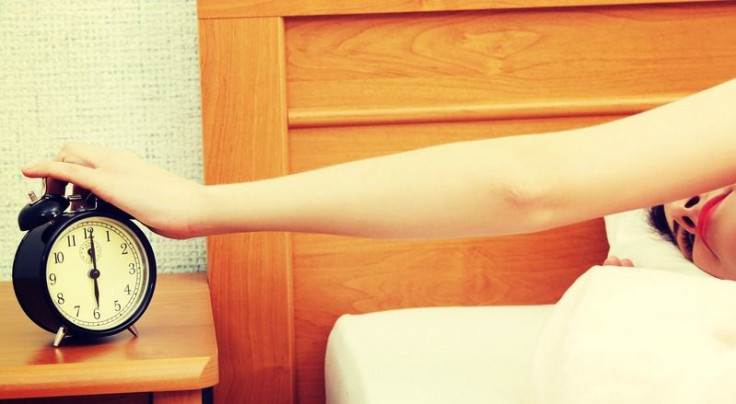Trouble Sleeping? Here's What We Learned About Getting Better Sleep in 2014

Sleep…so hot right now. Seriously — when we search our own content management system for the word “sleep,” we get seven pages of results from this past year alone. It’s not a new concept, and yet, it’s a part of the health conversation now more than ever.
The Third Pillar of Health
Though launched in 2013, the American Academy of Sleep Medicine (AASM) commissioned the National Healthy Sleep Awareness Project, which is founded on the idea if you sleep well, you feel well. Studies published in 2014 prove exactly that. One found a single night without sleep increased levels of molecules that are biomarkers for brain damage, killing otherwise brain cells; sleep deprivation can lead to a slew of health problems, including false memories and early death; and sleep disorders, like obstructive sleep apnea, can worsen fatigue and increase risk for disease, like diabetes and obesity.
"Insufficient sleep contributes to the risk for several of today's public health epidemics, including cardiovascular disease, diabetes, and obesity,” Dr. Timothy Morgenthaler, president of the AASM, said. “Getting at least seven hours of nightly sleep is a key to overall health.”
Some of these findings appear in Sleepless In America, a documentary that premiered on the National Geographic Documentary channel Sunday, Nov. 30. Mark Rosekind, a member of the National Transportation Safety Board, said, “every capability is degraded, impaired, when you lose sleep…your decision-making, reaction time, situational awareness, memory, communication.”
Experts also found almost all mental illnesses have associated sleep problems. But the most frightening fact, yesterday and today, is how much we miss out on when we don’t sleep. It inspires everything from creativity to a healthy immune system.
Quantity Vs. Quality
According to the AASM, there’s a major difference between quality sleep and the amount of hours slept (obviously quantity). Most adults need at least seven hours of sleep for optimal health and productivity, though this amount will change with age. Meanwhile, getting good sleep is something else entirely. This means avoiding sleep disrupters, such as snoring, undiagnosed sleep disorders, and restless leg syndrome. Basically anything that interrupts your cycles throughout the night.
The blue light on a smartphone may be the most common sleep thief today. A widely-reported study in 2014 came from the Organizational Behavior and Human Decision Processes, and it found using a smartphone later than nine p.m. negatively impacts both sleep and work performance the next day.
How it works: Blue light disrupts the release of melatonin, the sleep hormone, and increases alertness at the same time. The light on a smartphone is more problematic than the light from, say, your iPad. But that’s not an invitation to switch-up your mobile devices. Giving yourself proper time to settle down from the day is an essential component to an overall great night of sleep.
Necessity, Not Luxury
Dr. Andrew J. Westwood is an assistant professor of clinical neurology in the division of epilepsy and sleep medicine at Columbia University in New York City, and he’s not sure why it’s taken so long for people to realize how important sleep is. Still, he’s not complaining about the overall interest. Sleep, he told Medical Daily, affects everyone. It's no longer a luxury, but a necessity.
One new trend Dr. Westwood is weary of is the increased use of sleep trackers. These are usually built-in to activity trackers, such as the ones available from Fitbit and Jawbone.
“This is concerning, because people start to obsess over [aspects of their sleep] they don’t need to be,” he said. “These analytics are helpful for some people, but it’s often more detrimental. They start to worry, when, in reality, they may be sleeping just fine.”
Think of it like you would WebMd. Everyone knows not to search your symptoms on the Internet, because a tension headache spirals into brain cancer. This isn’t only inaccurate, but it’s panic-inducing. So if someone sees their sleep isn’t as “it should be,” they may worry they’re at a greater disadvantage than they really are.
Dr. Westwood also said many of the concerning studies we hear are in the preliminary stages. One he cited in particular found sleep aids increase risk for dementia. “It’s way too early to tell if there is a real link or not,” he said. “It shouldn’t be taken out of context.”
Ultimately, the quality sleep tips you hear of — maintain a regular schedule, no smartphones, no caffeine after a certain time of day — are more of a guideline. They may put a lot of people to bed, but a good night’s sleep varies from person to person.
“Sleep is a very personal thing,” Westood said. “Each recommendation I make is based on an individual person.”
What’s Next In 2015
The Alan Alda (yes, the actor) Center for Communicating Science at Stony Brook University annually hosts the Flame Challenge, in which scientists tackle an “eye-opening question that will interest and enlighten 11-year-olds, who judge the contest.” Perhaps unsurprisingly this year’s question is, “What is sleep?” It's the first Flame Challenge that asks a question about something that happens inside the brain and body, Elizabeth Bass, director of the Alda Center, said in a press release.
It looks like scientists won't be caught sleeping in 2015, possibly signing off on sleep trackers (or not) and what else it's going to take to get Americans in bed. Wait. You know what we mean.



























